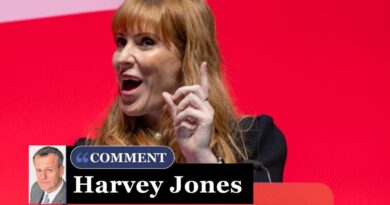Martin Lewis warning to anyone with more than £10,000 in a savings account | Personal Finance | Finance
The financial guru Martin Lewis has issued an important alert to savers regarding a crucial threshold at which they will have to start paying tax on their savings. In his BBC Podcast, while responding to a listener’s query about saving-related taxation, Mr Lewis clarified a common misconception: it’s not the savings but the interest on them that gets taxed.
The Money Saving Expert founder specified two key thresholds for savings —£10,000 and £20,000—that depend on one’s earnings and could impact the amount of tax payable on savings. Moreover, he highlighted strategies to minimize tax by utilising the right types of accounts.
Radio presenter Adrian Chiles voiced the frustration of many, saying: “Christina’s fed up – she’s sick of working hard getting taxed on income and then taxed on savings. How does that work? So frustrating.”
Martin was quick to clarify: “Well forgive me you are not taxed on savings. You do not pay tax on your savings. You pay tax on the interest earned on savings. And I know it is a fine difference but it is an important one. You put money in the bank or building society or wherever you do in a deposit savings account and you do not pay any tax on the money you put in, you only pay tax on the money you’ve earned.”
He added: “This is because it is treated like any other form of income although it does have special allowances and it’s really important to actually focus on what those special allowances are.”, reports the Manchester Evening News.
Breaking down the tax-free savings for the public, Mr Lewis highlighted that the critical number to remember is £12,570. He detailed, “The first thing to say is everybody has £12,570 that they can earn from any source, whether earned income or savings interest, or anything else which you don’t pay tax on – your normal standard tax-free personal allowance.”
He continued by pointing out the additional savings buffer for basic rate taxpayers: “In savings specifically you then have, if you’re a basic 20 per cent rate taxpayer, £1,000 a year of interest you can earn from any savings source which you don’t pay tax on. That’s £1,000 of interest, not £1,000 in a savings account.”
Insightfully, he explained how much money people should be cautious about having in their savings account to maximise tax efficiency: “What it means is that in a good savings account people need to be wary of how much money is in there – with normal rate taxpayers being fine with £20,000 in savings.”
Clarifying further, Mr Lewis said, “So at 5 per cent interest as a basic rate taxpayer you can put £20,000 in a savings account and it would be tax free because that would generate £1,000 of interest.”
Ultimately, he outlined the situation for higher earners, noting the limitations on tax relief: “As a higher 40 per cent rate taxpayer, you’re allowed £500 of interest tax-free. So it would be £10,000 in there that would save you and you wouldn’t pay interest if you have in the top 5% savings account. If you happen to be lucky enough to be a top 45 per cent rate taxpayer earning over £125,000 you don’t get one of these,” Mr Lewis explicated.
Mr Lewis, the financial guru, has shed light on a lesser-known tax allowance for low earners or those living solely off interest from savings. He explained: “There is another savings allowance that is rarely spoken about. This is called the starting savings allowance. Now this is for low earners and it’s quite complicated.”
He went on to detail: “So what it says is you can earn up to £5,000 on top of your £1,000 as a basic rate taxpayer of interest tax free as a low earner. If you have earned income under £12,570, which is the standard tax allowance, you can earn £5,000 on top of that in savings in this starting savings allowance in savings interest, which is untaxed. For every pound you earn above £12.570 you lose a pound of the £5,000. ” Mr Lewis illustrated his point with an example: “If you earned £13,570 you’d only get £4,000 for your starting savings allowance.”
He added: “For people where all of their money was generated by savings interest they would have £12,570, their normal tax free allowance, they would have their £5,000 starting savings allowance and they would have their £1,000 savings allowance ads a basic rate taxpayer which means you can earn £18,570 tax free if all your money came from savings interest. And then you could have an ISA on top for £20,000 a year, which would be tax-free, and you could put money into Premium Bonds, £50,000 of which would be tax-free.”
Mr Lewis has spoken out about the common misconception of ‘double taxation’ on savings, stating: “Let’s be technical, it’s not – there are other things that are double taxation but you get taxed on the amount of money you earn on your income, and then you get taxed on the amount of money you earn on your savings. You do not get taxed on your savings.”
To discover more insights, tune into the full podcast by following this link.




